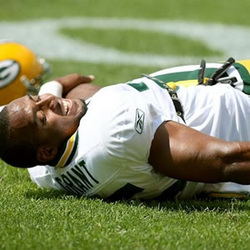The beginning of the professional football season is upon us, but for millions of hardcore football fans, it is the fantasy football season that may hold greater significance. Fantasy football brings out the virtual general manager in any football fan as rosters are analyzed closely, friends or co-workers are sudden rivals and every game on TV has importance.
For those who don't know, Fantasy Football is a game in which participants (called owners) are arranged into a league. The person who creates the league is called the commissioner, and that person invites other owners into his/her league. Each team drafts or acquires via auction a team of real-life football players and then scores points based on those players' statistical on-the-field performances each week.
Fantasy football, a niche pastime just 10 years ago, has blossomed to the point that nearly every office has at least one league, probably more. Participants go to great lengths to prepare strategies for their annual drafts, oftentimes perusing magazines, Web sites and other sources -- all in an effort to get the edge over their opponents. The fantasy football frenzy has littered the country with odd nicknames, strange league traditions and ongoing scrutiny of players and matchups.
How far have fantasy sports permeated the sports entertainment business? More than a dozen magazines are currently on newsstands, each promising to help fantasy players find the best players for their team. CBS, Fox, and ESPN each devote significant air time toward promoting their online fantasy products and run regular statistical updates during games to cater to the fantasy football-playing viewers. A recent Sports Illustrated article notes that 28 percent of CBS-partnered Sportsline’s revenue comes from fantasy sports.
Most local sports-talk-radio stations have had to adapt to accommodate the booming listener interest in fantasy sports. Nine years ago, Twin Cities sports talker KFAN was struggling with fantasy football callers dominating its programming throughout the day. The station stopped the intrusion by giving fantasy programming its own weekly show. The show remains on the air today and provides the station with its strongest weekend ratings.
Fantasy sports has grown enough that corporate America is beginning to market directly to participants. This year, for the first time, a major retailer is getting behind fantasy sports. Backed by 70 weekly prizes worth more than $20,000, Best Buy has rolled out a free-to-play online fantasy football game. The game challenges users to create a roster of fantasy players while staying under a salary cap. Prizes include plasma televisions and home theater sound systems.
Being a fantasy player and sports fan is not just about passion and the thrill of the game. It’s also about being social – with friends, family, and of course any rival-team supporters. It is the bragging rights you get within your officemates or your friends and the cheering sound of your draft fans or other people that makes it even better. So are you ready for Fantasy football? Let’s play fantasy football now.
For those who don't know, Fantasy Football is a game in which participants (called owners) are arranged into a league. The person who creates the league is called the commissioner, and that person invites other owners into his/her league. Each team drafts or acquires via auction a team of real-life football players and then scores points based on those players' statistical on-the-field performances each week.
Fantasy football, a niche pastime just 10 years ago, has blossomed to the point that nearly every office has at least one league, probably more. Participants go to great lengths to prepare strategies for their annual drafts, oftentimes perusing magazines, Web sites and other sources -- all in an effort to get the edge over their opponents. The fantasy football frenzy has littered the country with odd nicknames, strange league traditions and ongoing scrutiny of players and matchups.
How far have fantasy sports permeated the sports entertainment business? More than a dozen magazines are currently on newsstands, each promising to help fantasy players find the best players for their team. CBS, Fox, and ESPN each devote significant air time toward promoting their online fantasy products and run regular statistical updates during games to cater to the fantasy football-playing viewers. A recent Sports Illustrated article notes that 28 percent of CBS-partnered Sportsline’s revenue comes from fantasy sports.
Most local sports-talk-radio stations have had to adapt to accommodate the booming listener interest in fantasy sports. Nine years ago, Twin Cities sports talker KFAN was struggling with fantasy football callers dominating its programming throughout the day. The station stopped the intrusion by giving fantasy programming its own weekly show. The show remains on the air today and provides the station with its strongest weekend ratings.
Fantasy sports has grown enough that corporate America is beginning to market directly to participants. This year, for the first time, a major retailer is getting behind fantasy sports. Backed by 70 weekly prizes worth more than $20,000, Best Buy has rolled out a free-to-play online fantasy football game. The game challenges users to create a roster of fantasy players while staying under a salary cap. Prizes include plasma televisions and home theater sound systems.
Being a fantasy player and sports fan is not just about passion and the thrill of the game. It’s also about being social – with friends, family, and of course any rival-team supporters. It is the bragging rights you get within your officemates or your friends and the cheering sound of your draft fans or other people that makes it even better. So are you ready for Fantasy football? Let’s play fantasy football now.

 RSS Feed
RSS Feed